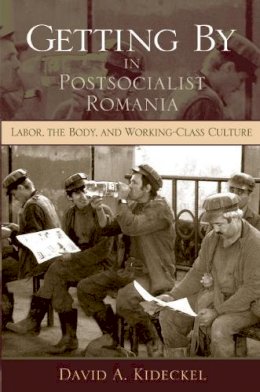
Stock image for illustration purposes only - book cover, edition or condition may vary.
Getting By in Postsocialist Romania: Labor, the Body, and Working-Class Culture
David A. Kideckel
FREE Delivery in Ireland
Description for Getting By in Postsocialist Romania: Labor, the Body, and Working-Class Culture
Paperback. A poignant portrayal of the price of postsocialist transition for industrial workers Series: New Anthropologies of Europe. Num Pages: 288 pages, 11 b&w photos, 2 maps. BIC Classification: 1DVWR; GTB; JFSC; JHBL; JHMP. Category: (P) Professional & Vocational. Dimension: 5969 x 3963 x 16. Weight in Grams: 440.
This compelling ethnographic study describes how two groups of Romanian industrial workers have fared since the end of socialism. Once labor's elite, the celebrated coal miners of the Jiu Valley and the chemical workers of the Fagaras region had many social privileges and often derived genuine satisfaction from their work. Today, they are a rarely noted casualty of postsocialist transformations. Fear, distance, and alienation are the physical manifestations of stress experienced due to their precarious job status, declining health, and loss of a social safety net. Kideckel traces these issues in the context of labor, political relationships, domestic and community ... Read morelife, gender identities, and health. Drawing on more than three decades of fieldwork, he presents many narratives from select individuals, in their own words, providing a poignant and illuminating perspective on the everyday lives of ordinary people.
Show Less
Product Details
Publisher
Indiana University Press United States
Series
New Anthropologies of Europe
Place of Publication
Bloomington, IN, United States
Shipping Time
Usually ships in 7 to 11 working days
About David A. Kideckel
David A. Kideckel is Professor of Anthropology at Central Connecticut State University. He is author of The Solitude of Collectivism: Romanian Villagers to the Revolution and Beyond and has produced a video documentary focusing on Romania's Jiu Valley coal miners, entitled Days of the Miners: Life and Death of a Working Class Culture.
Reviews for Getting By in Postsocialist Romania: Labor, the Body, and Working-Class Culture
Kideckel's extensive fieldwork among Romania's Jiu Valley and Fagaraş coal miners, coupled with the workers' narratives quoted throughout the book, lends authority to his detailed analysis of the denigrating conditions suffered by "once celebrated" people. The regions under study were prosperous coal-producing areas that attracted a multicultural workforce. In the postsocialist era, as a transformed Romania becomes a consumer society, ... Read morethe miners are the "canaries in the coal mine of postsocialism," Kideckel asserts. The workers strive to maintain "a tenuous hold on life, work, family, and community" in the face of economic restructuring, privatization, and buyouts. The security and status they felt in socialist society have disappeared. This book contains many firsthand accounts from workers, grounding Kideckel's generalizations in the gritty lives endured by the miners and their families. Kideckel's contribution is the eighth in the publisher's "New Anthropologies of Europe" series. It is emblematic of the series goal to publish ethnographic manuscripts that examine topics such as globalization, ethnicity, and market reform and, at the same time, contribute to theory building in social sciences. Summing Up: Highly recommended. Upper-division undergraduates and above.
Choice L. De Danaan, emerita, Evergreen State College, April 2009 "Kideckel's book gives a voice to the Romanian working class and lets them speak for themselves... [he] states in a pointed manner that the meaning of 'getting by' has shifted from 'manipulating the system in one's interest' to managing basic survival' in every sphere of life." —H-SAE, June, 2011 "What makes the book a ‘must-read’ for those interested in post-socialist Eastern Europe, or labour issues, is the fact that David Kideckel listens. He transforms the detailed account of day-to-day lives into authentic carefully interpreted written testimonies. This corpus of reflections makes an important contribution to Eastern European studies and reading it cannot leave a heart unmoved by the simple but powerful experiences that an entire social class was and is struggling with in post-socialist Romania." —Gabriela Walker, University of Illinois at Urbana-Champaign, Europe - Asia Studies, Vol. 61.9 Nov. 2009 "... the text is wholly evocative, compellingly written, and clearly organized. 'Getting By in Postsocialist Romania' should appeal to a wide range of audiences, including scholars of postsocialist studies, those interested in issues of economic policy and development, health, and gender studies, and to students at all levels." —Karen Kapusta-Pofahl, American Ethnologist "The book is a valuable contribution to the field of postsocialist studies offering a compassionate discussion of the day-to-day experience of the depressed former industrial worker. It is engagingly written... by the author who has over thirty years of ethnographic research experience in Romania. It makes an excellent text for both undergraduate and graduate courses that deal with working-class culture, postsocialism, Eastern Europe, as well as social transformation and political economy to show how consumption and production are intimately related in the development of working-class identity." —Canadian American Slavic Studies "David Kideckel challenges celebratory images of postsocialism by focusing on the often neglected working class and allowing the disenfranchised to speak for themselves. In so doing he provides a contribution to the ethnography of eastern Europe that speaks poignantly to broader discussions of work, class, and gender under neoliberalism." —Gerald Creed, Hunter College and the Graduate Center, City University of New York "Overall, this is a very valuable book that sheds considerable light on a subject that is rarely covered in most literature on Romania." —Slavonic and East European Review, Vol. 88.3, July 2010 Show Less

